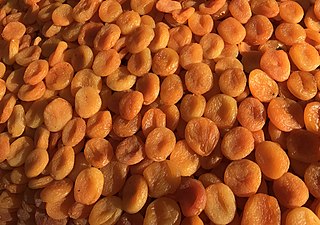Apricot Fruit in Malayalam
- Apricot Fruit name in Malayalam is “Mutta Pazham” (or) “Sheema Pazham”.
BUY APRICOT FRUIT PRODUCTS ONLINE

Apricot Fruit
Apricots, scientifically known as Prunus armeniaca, are a delightful and versatile fruit with a rich history. These small, round or oval fruits are prized for their sweet and slightly tart flavor, and they are a staple in many culinary traditions around the world.
Physical Characteristics: Apricots are typically small, ranging from the size of a ping pong ball to a golf ball. They have smooth, velvety skin that can vary in color from pale yellow to deep orange. Inside, they house a single, large seed or pit. The flesh of apricots can range in color from pale yellow to deep orange, depending on the variety.
Flavor and Taste: The hallmark of apricots is their delectable flavor. When perfectly ripe, they offer a harmonious blend of sweetness and a subtle tartness. Their flesh is tender, juicy, and often compared to a fusion of peach and plum with a hint of acidity, making them a favorite in a wide range of culinary creations.
Culinary Uses: Apricots are incredibly versatile in the kitchen. They can be enjoyed fresh as a standalone snack, added to fruit salads for a burst of flavor, or used as a key ingredient in a variety of desserts. From apricot pies, tarts, and cobblers to jams, preserves, and chutneys, these fruits lend their unique flavor to an array of sweet and savory dishes.
Varieties: There are numerous apricot varieties, each with its own distinctive characteristics, including variations in flavor, texture, and color. Some popular varieties include the Moorpark, Royal Blenheim, and the more modern cultivars developed for improved disease resistance and fruit production.
Cultural Significance: Apricots have cultural significance in many regions. For example, they have a revered place in Central Asian and Middle Eastern cuisines, where they are used in both sweet and savory dishes. In Armenian culture, the apricot is considered the national fruit, and it features prominently in their culinary traditions.
Seasonality: Apricots are typically in season during the summer months, and they are celebrated for their freshness and flavor during this time. They are often enjoyed at picnics, added to fruit baskets, and incorporated into various summer recipes.
Apricot Fruit Benefits
Apricots are not only delicious, but also offer several health benefits. Here are some of the benefits associated with apricot consumption:
- Rich in Vitamins: Apricots are a good source of essential vitamins, particularly vitamin A and vitamin C. Vitamin A is important for maintaining healthy vision, skin, and immune function. Vitamin C is an antioxidant that helps protect cells from damage and boosts the immune system.
- Dietary Fiber: Apricots are rich in dietary fiber, which is beneficial for digestion. Fiber helps prevent constipation, promotes regular bowel movements, and may contribute to lower cholesterol levels.
- Potassium: Apricots contain potassium, which is an important mineral for heart health. Potassium helps regulate blood pressure and plays a role in maintaining normal heart rhythm.
- Antioxidants: Apricots contain various antioxidants, including beta-carotene and quercetin. Antioxidants help neutralize harmful free radicals in the body, which can reduce the risk of chronic diseases and promote overall well-being.
- Phytonutrients: Apricots contain phytonutrients, such as lycopene and lutein, which have been associated with various health benefits. Lycopene, for example, is linked to a reduced risk of certain cancers and heart disease.
- Low in Calories: Apricots are relatively low in calories, making them a healthy snack option for those looking to manage their weight.
- Skin Health: The vitamin A and antioxidants in apricots can contribute to healthier skin. Vitamin A is essential for maintaining skin health, and antioxidants help protect the skin from the damaging effects of UV rays and pollution.
- Eye Health: The vitamin A in apricots is vital for good vision. It supports the functioning of the retina and helps prevent eye conditions like night blindness.
- Bone Health: Apricots contain calcium and phosphorus, which are important minerals for maintaining healthy bones. They can contribute to stronger bones and help prevent conditions like osteoporosis.
- Hydration: Apricots have a high water content, which can help keep you hydrated, particularly in hot weather.








